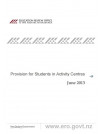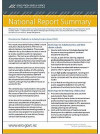This national report presents the findings of ERO’s recent evaluation of the 14 Activity Centres in New Zealand providing alternative schooling for secondary students likely to benefit from a specialist programme.
Key Results
According to The Toolkit, effective Activity Centres have:
- effective governance and support from the cluster
- clearly understood induction processes for students transitioning into the Centre
- individual education plans, detailing how each student is to be supported to make social and academic progress
- curricula that responds to the individual strengths, aspirations and needs of each student
- connections with parents and whānau that support student learning
- links to social agencies that help manage social and health issues
- transition processes that effectively support students to move to further education.
ERO found that the performance of the 14 Activity Centres was highly variable. All of the Activity Centres were safe and welcoming and typically had good relationships between staff and students. They were all focused on improving the educational and social outcomes for students, although that they had different levels of success for this. The variability was mostly evident in the quality of governance and education programmes, and the success of transition processes for students moving to and from the Activity Centre.


